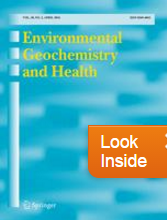 Environmental Geochemistry and Health has retracted two papers after an investigation suggested that the peer-review process had been compromised.
Environmental Geochemistry and Health has retracted two papers after an investigation suggested that the peer-review process had been compromised.
In case you’re counting, we’ve now logged approximately 300 retractions stemming from likely faked or rigged peer review.
The retraction note — which is the same for both papers — explains a bit more about the situation:
This article has been retracted by the Editor-in-Chief. After a thorough investigation carried out according to the Committee on Publication Ethics guidelines, we have strong reason to believe that the peer review process was compromised.
One of the retracted papers, “Estimation of Anticipated Performance Index and Air Pollution Tolerance Index and of vegetation around the marble industrial areas of Potwar region: bioindicators of plant pollution response,” tested plants for their sensitivity to pollution. It has been cited three times, according to Thomson Reuters Web of Science.
The other study in question, “Release, deposition and elimination of radiocesium (137Cs) in the terrestrial environment,” reviewed literature about radiocesium emissions into the atmosphere; it has been cited twice.
Ming Hung Wong, research chair professor of environmental science at The Hong Kong Institute of Education and editor-in-chief of Environmental Geochemistry and Health, declined to comment on the retractions.
We’ve discovered another retraction from 2012 for the corresponding author on both papers, Muhammad Aqeel Ashraf, based at the University of Malaya in Kuala Lumpur, Malaysia. That paper, “Luciferase-transfected colon adenocarcinoma cell line (DLD-1) for use in Orthotopic Xenotransplantation studies,” was retracted from the Chemistry Central Journal only months after publication, when the lead author (not Ashraf) took responsibility for using data without permission.
Its retraction note reads:
This article is retracted.
The data in this article [1] was used without permission by the lead author Muhammad Rashid Siddique.
The lead author accepts full responsibility and would like to apologize to the owners of the data (Dr Steve Shnyder, University of Bradford, UK), as well as the co-authors of this article, the Editors and readers.
We’ve reached out to Ashraf and will update the post if we hear back.
Like Retraction Watch? Consider making a tax-deductible contribution to support our growth. You can also follow us on Twitter, like us on Facebook, add us to your RSS reader, sign up on our homepage for an email every time there’s a new post, or subscribe to our new daily digest. Click here to review our Comments Policy. For a sneak peek at what we’re working on, click here.
An OMICS profile describes Dr. Ashraf as follows:
http://www.omicsonline.org/speaker/m-a-ashraf-university-of-malaya-malaysia/
“Muhammad Aqeel Ashraf has completed his Ph.D. at the age of 28 years from niversity of Malaya, Malaysia and postdoctoral studies from Tokyo Institute of Technology, Japan. He is Assistant Professor of Environmental Geology at University of Malaya. He has published more than 46 papers in reputed journals and serving as an editorial board member of repute.”
If the Abstract for his presentation to an OMICS mockademic conference is any guide, the subject was the same as his cesium paper (retracted for fake reviewers) .
ResearchGate places Dr. Ashraf at Central South University of Forestry and Technology, Ch’ang-sha-shih, Hunan, China:
https://www.researchgate.net/researcher/65980937_Muhammad_Aqeel_Ashraf
This researcher submitted a manuscript to my journal exactly one year ago, listing 10 co-authors. When I asked him to provide email addresses for the co-authors, he gave me 10 email addresses comprised of variations on his name at yahoo or gmail. I told him this was fishy and asked for their institutional emails. I haven’t heard back.